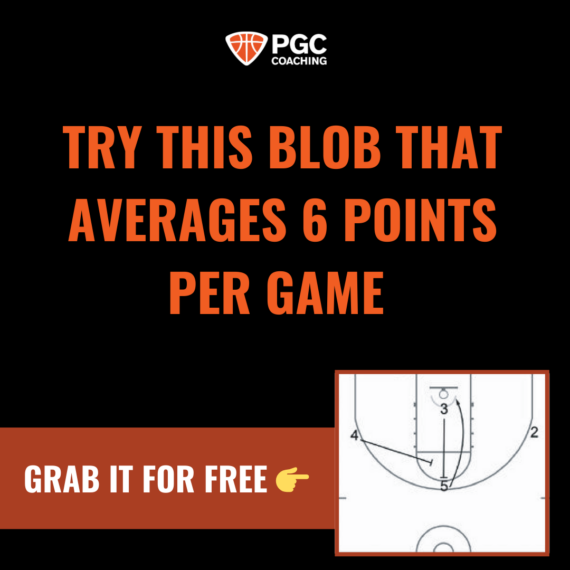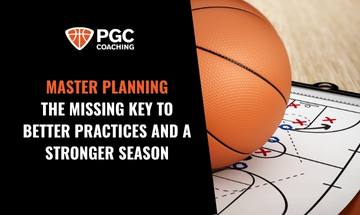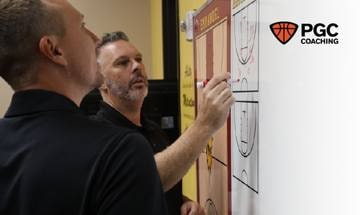How to Execute a Great Basketball Practice
One of the most common things I see with coaches is this: they want a great practice, but they don’t always know how to execute a great basketball practice — or what to do when things don’t go according to plan.
Let’s break down two things every coach must learn:
- How to run a sharp, intentional practice
- How to adapt when the plan breaks down
Because if your practices aren’t improving your team, you’re just checking a box.
And before we go through ways you can improve practices and avoid going through the motions, here are a few other tools you may want to review after this…
- Master Planning: The Missing Key to Better Practices and a Stronger Season
- How to Design Better Basketball Practices (Without Overthinking It)
- Why I Spent 12 Straight Practices on the Read & React (and Didn’t Teach Defense)
1. How to Execute a Great Basketball Practice
A “great basketball practice” means something different to every coach. But one thing’s true across the board: the best practices are won in the details.
Here are three keys to executing your practice with excellence:
Cover the Details Before the Whistle Blows
Ask yourself:
- Do your assistants, managers, or parent volunteers know their roles?
- Do your players know what’s expected of them?
- Are you eliminating wasted time between drills?
If your transitions are slow and players are unclear on what’s next, you lose real minutes. And you can’t afford that.
Define What It Means to “Win” Each Segment
Every drill should have a specific goal. Players need clarity. If they don’t know what the focus is, you’ll get effort without direction, and growth without development is just motion.
That said, be sure to tell your players what you’re looking for. For example, “To win this drill, we’ve got to rebound and execute cuts.”
Design with the End in Mind
Before practice starts, ask:
- What do we need to walk away better at today?
- How will we know if we got there?
For example, let’s say your goals are communication, passing, and getting a high volume of shots. If those three things aren’t obvious by the end, you missed the mark — no matter how many drills you ran.
2. How to Adapt a Practice Plan Mid-Flight
Here’s the reality: practice rarely goes exactly the way you wrote it down.
Maybe you planned 6 minutes for a drill… and after 6 minutes, your players still don’t understand what they’re doing. Now you’re stuck.
You’ve got two choices:
- Stick to the clock and move on (and waste the last 6 minutes)
- Extend the drill, cut something else, and get to the important part
That decision can be hard in the moment — unless you plan for it.
Here’s how:
Know What’s Negotiable
Before practice starts, ask yourself:
- “What’s fluff on this practice plan?”
- “If something runs long, what gets cut?”
Be clear on that early, not in the middle of practice when your head’s spinning.
Learn From Your Own Patterns
If you’re consistently planning 20 things and only getting to 8, you’re not planning — you’re hoping. Trim the fat. Prioritize the 12 most important things, and let your execution grow from there.
When you over-plan, you under-develop. Don’t cover everything and master nothing.
FAQ: How to Execute and Adapt a Great Basketball Practice
Q: What defines a great basketball practice?
A: A great basketball practice is one where every minute drives intentional improvement. It includes:
- Clear goals for each drill and segment
- Efficient transitions and time usage
- Progress in targeted skills or team systems
The best practices focus on quality over quantity—what gets coached is what gets improved.
Set daily practice goals before every session to define success clearly.
Q: How can I eliminate wasted time during practice?
A: Wasted time comes from poor transitions and unclear communication. To fix that:
- Assign assistant roles in advance
- Use whiteboards or practice scripts for player awareness
- Pre-set cones and stations before practice starts
Planning logistics matters as much as planning drills.
Pre-load equipment, assign roles, and script transitions to save valuable minutes.
Q: What does it mean to “win” a drill during practice?
A: “Winning” a drill means meeting a clear, specific standard. It gives players a tangible goal and improves focus. Examples:
- “Win = 5 clean closeouts in a row”
- “Win = 8 made shots in 60 seconds”
- “Win = no turnovers for a full segment”
It’s not just about reps—it’s about reps with purpose.
Define the standard for each drill so players train with clarity and intent.
Q: How do I know if a practice was successful?
A: Ask two questions post-practice:
- Did we make progress on our 1–3 key objectives?
- Did players leave better than they arrived?
If your answers are “yes,” the practice was a win—even if it looked messy at times.
Debrief daily with your staff or notes to measure success and refine future sessions.
Q: What should I do if a drill isn’t going well?
A: Instead of pushing forward or abandoning it entirely, try:
- Simplifying instructions
- Pausing to demo key points
- Adding constraints to guide player choices
Or, extend the drill and cut time elsewhere—but only if it aligns with your main goal.
Prioritize progress, not the original timeline—be flexible with intention.
Q: How can I better adapt when practice goes off-plan?
A: Build a mental “flex zone” into your plan:
- List 1–2 drills you’re okay skipping
- Circle top priorities that must get done
- Give assistants flexibility to lead if you need to troubleshoot
That way, you’re not guessing—you’re adapting with purpose.
Mark “non-negotiables” on your plan so you always know what to protect.
Q: What are the biggest mistakes coaches make in practice planning?
A: Common missteps include:
- Planning too many drills and finishing none
- Not aligning drills to daily goals
- Poor communication with assistants or players
- Lack of built-in flexibility for breakdowns
Great practices are focused, communicated, and coachable.
Simplify your plan and connect every drill to your daily purpose.
Q: How can I improve my practice planning long-term?
A: Track your sessions with post-practice notes:
- What worked and why?
- What took too long or underwhelmed?
- Did players retain what they learned?
This self-scouting process turns each plan into a learning tool for the next.
Build a habit of reflecting after each practice—it’s how the best coaches grow.
Q: Where can I get support and ideas for basketball practice plans?
A: The PGC Coaching Community offers:
- Sample practice templates
- Drill videos with coaching points
- Planning tools to help you adapt and execute more effectively
You’ll gain access to elite-level insights and tools that simplify the process.
Join the PGC Coaching Community with a free 7-day trial to elevate your practice planning.
Final Thought
Every practice should move your team forward, not just wear them out.
The better you prepare and the more intentionally you adapt, the more you’ll see actual progress.
So before your next practice:
- Plan to execute
- Prepare to adapt
- Push the rock forward
If you’d like to explore even more resources just like this, grab a free 7-day trial to get access to our members-only content.
– TJ
Check more practice planning and execution resources here.
About the Author
TJ Rosene
Coach TJ Rosene, head coach of the Emmanuel University men’s basketball team and Director of Coach Development for PGC Coaching, has spent his career shaping young athletes both on and off the court. With over 400 career wins and 12 seasons of 20+ wins, Rosene’s coaching experience is extensive and impressive. His teams have competed in six national championship games, winning three NCCAA National Championships. Under his leadership, the Lions made their NCAA Division II debut in 2018-19 and quickly captured two season titles and one tournament title, along with an appearance in the NCAA Division II Sweet 16 in 2021.
Rosene’s success expands far beyond the scoreboard. He’s been named National Coach of the Year three times and Conference Carolinas Coach of the Year twice. But for Coach Rosene, the most meaningful part of his work is the lasting impact he has on his players’ lives. As he puts it, “Coaching is a rare opportunity to shape and mold the lives of young people. It’s a privilege that I never take for granted.”
New Here?
Get coaching tips and tools like these delivered to your inbox each week!
Join the 15,000 coaches we’ve assisted…

Related Articles
Master Planning: The Missing Key to Better Practices and a Stronger Season
Plan smarter, win bigger. Master basketball practice planning by starting with the big picture and working backward. Build a season that develops players and drives results.
How to Design Better Basketball Practices (Without Overthinking It)
Design smarter practices. Learn how to structure high-impact basketball sessions using intensity systems, learning arcs, and competitive decision-making—plus plug-and-play drills you can use today.
Why Shooting Success in Practice Doesn’t Transfer to Games (and How Coaches Can Fix the Gap)
Your team shoots well in practice, but game night tells a different story. The issue isn’t confidence; it’s whether your shooting standards survive pressure.
About PGC
PGC Basketball provides intense, no-nonsense basketball training for players and coaches. Our basketball camps are designed to teach players of all positions to play smart basketball, be coaches on the court, and be leaders in practices, games and in everyday life.
We combine our unique PGC culture with a variety of teaching methods and learning environments to maximize the learning potential of those that attend our sessions. In addition to spending 6-7 hours on the court each day, lessons will be reinforced through classroom sessions and video analysis.
Our goal at PGC is to empower you with the tools to fulfill your basketball dreams, while also assisting you in experiencing the joy of the journey.
To learn more about PGC Basketball, including additional basketball training tips and videos, visit our YouTube Channel or find us on Facebook, Instagram, and Twitter.






Share This Post